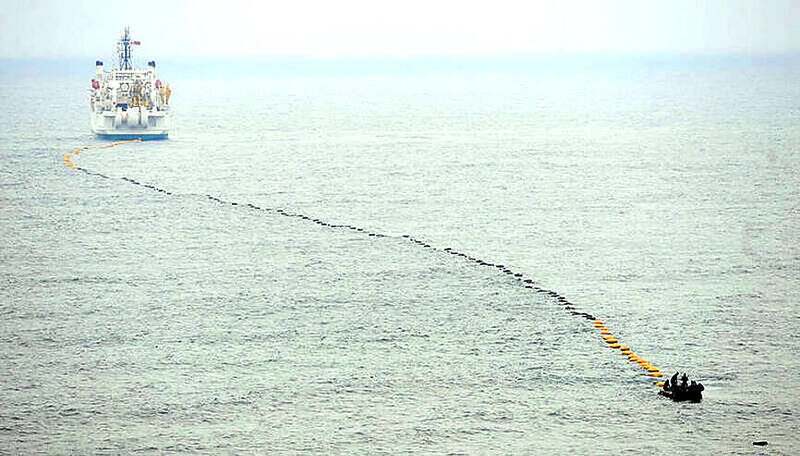The government is considering bills to regulate subsea cables to prevent China from employing “gray zone” tactics to cut cables near Taiwan, a Cabinet official said yesterday.
The remark came after President William Lai (賴清德) said in an exclusive interview with the Chinese-language Liberty Times (the Taipei Times’ sister paper) that the Cabinet would propose seven bills to protect Taiwan’s subsea cables.
Lai said in the interview that national security agencies have listed the Chinese oil tankers and freighters that have joined China’s military exercises, as well as the ships that have damaged undersea cables, for special monitoring.

Photo: Taipei Times
Taiwan has close links to other countries, so even though the subsea cables are mainly used by Taiwan, disruptions would affect international cooperation and communications, he said, adding that the nation would also work with other countries to protect the subsea cables.
Democratic Progressive Party Legislator Wang Ting-yu (王定宇) said that the bills would provide the legal basis for law enforcement to crack down on subsea cable sabotage.
Hopefully, other nations can establish a cooperative platform to stop China from using private vessels operating under flags of convenience to engage in “gray zone” activities, he said.
The proposals could also prohibit such ships from entering Taiwanese waters and ports, to prevent them from carrying out Chinese military operations, which poses a security vulnerability, he said.
Chinese ships operating under flags of convenience have performed harassment actions and damaged subsea cables, not only near Taiwan, but also in the Baltic Sea, which affects the stability and safety of international communications networks, Wang said.
Taiwan would establish cooperative mechanisms with other countries to counter such activities, including through legislation, crackdowns and detaining ships, he added.
Additional reporting by Hsieh Chun-lin

The Chinese military has built landing bridge ships designed to expand its amphibious options for a potential assault on Taiwan, but their combat effectiveness is limited due to their high vulnerability, a defense expert said in an analysis published on Monday. Shen Ming-shih (沈明室), a research fellow at the Institute for National Defense and Security Research, said that the deployment of such vessels as part of the Chinese People’s Liberation Army (PLA) Navy’s East Sea Fleet signals a strong focus on Taiwan. However, the ships are highly vulnerable to precision strikes, which means they could be destroyed before they achieve their intended

The first two F-16V Bock 70 jets purchased from the US are expected to arrive in Taiwan around Double Ten National Day, which is on Oct. 10, a military source said yesterday. Of the 66 F-16V Block 70 jets purchased from the US, the first completed production in March, the source said, adding that since then three jets have been produced per month. Although there were reports of engine defects, the issue has been resolved, they said. After the jets arrive in Taiwan, they must first pass testing by the air force before they would officially become Taiwan’s property, they said. The air force

GLOBAL: Although Matsu has limited capacity for large numbers of domestic tourists, it would be a great high-end destination for international travelers, an official said Lienchiang County’s (Matsu) unique landscape and Cold War history give it great potential to be marketed as a destination for international travelers, Tourism Administration Director General Chen Yu-hsiu (陳玉秀) said at the weekend. Tourism officials traveled to the outlying island for the Matsu Biennial, an art festival that started on Friday to celebrate Matsu’s culture, history and landscape. Travelers to Matsu, which lies about 190km northwest of Taipei, must fly or take the state-run New Taima passenger ship. However, flights are often canceled during fog season from April to June. Chen spoke about her vision to promote Matsu as a tourist attraction in

PAWSITIVE IMPACT: A shop owner said that while he adopted cats to take care of rodents, they have also attracted younger visitors who also buy his dried goods In Taipei’s Dadaocheng (大稻埕), cats lounging in shops along Dihua Street do more than nap amid the scent of dried seafood. Many have become beloved fixtures who double as photography models, attracting visitors and helping boost sales in one of the capital’s most historic quarters. A recent photo contest featuring more than a dozen shop cats drew more than 2,200 submissions, turning everyday cat-spotting into a friendly competition that attracted amateur and professional photographers. “It’s rare to see cats standing, so when it suddenly did, it felt like a lucky cat,” said Sabrina Hsu (徐淳蔚), who won the NT$10,000 top prize in